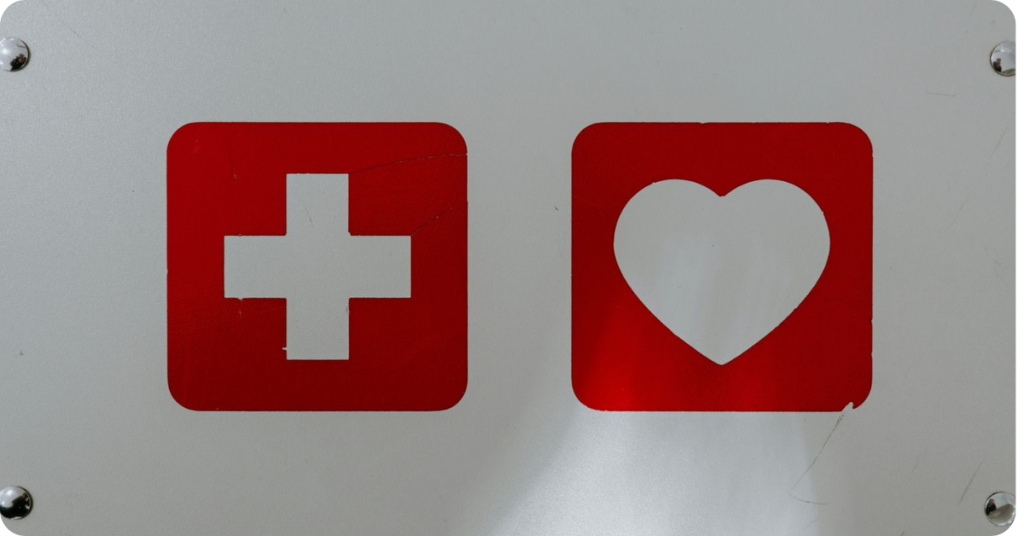Mental health first aid—equipping your tech team to support each other
-
Morgane Oléron

Whether at home or at work, it is advised to always have a first aid kit at hand for those times when we cut our fingers, scratch our knees, or have a terrible headache.
We find it normal and necessary to be able to attend to someone who’s just hurt themselves with the basic tools: bandaid, antiseptic cream, pain reliever or wipes. Yet chances are, especially in the tech industry, that invisible wounds like stress and anxiety are more frequent at the office than a finger cut. But where is the first aid kit for that?
In this article, we will show how Mental Health First Aid training for HR and employees can foster a culture of peer support and early intervention.
What is Mental Health First Aid and Why it Matters in the Tech Industry?
As mentioned in our introduction, Mental Health First Aid is similar to physical first aid. It provides initial support for mental health issues until professional help becomes available.
It focuses on early intervention, non-judgment, risk assessment, confidentiality and guidance towards professional help.
As we know, mental health issues among tech employees are particularly high. Stress, burnout, and anxiety, to name a few, impact team morale, turnover and productivity. MHFA can help other employees with identifying early signs of mental health issues due to:
High-Pressure Work Environments
Tight deadlines, long hours, being “always connected”, and rapid innovation and iteration cycles can easily lead to stress and burnout.

Remote Work Challenges
The increase in hybrid/remote setups can, at times, increase a sense of isolation and blur the boundaries between work and personal life, which can be difficult to navigate for some individuals.
Stigma
While it is evolving, the “always-on” or ” Tech Bro” culture have contributed to discouraging conversations around mental health.
The benefits for Tech teams are numerous. Early identification and intervention of mental health issues help reduce absenteeism, improve productivity, and retain employees while supporting a stronger and more empathetic team culture.
How Mental Health First Aid Differs from Traditional Employee Support Programs
It is important to underline that Mental Health First Aid is different from Employee Support Programs. MHFA is a proactive and peer-driven approach led not just by HR or leadership but by the employees themselves.
While Employee Support Programs like Siffi provide access to resources, tools, and professional counselling, Mental Health First Aiders offer initial support and guidance.
Mental Health First Aiders are frontline volunteers among employees who have received the proper training to identify warning signs, but they are not therapists or counsellors.
Both support and complement each other very well through proactive and reactive actions.

Who Are the Mental Health First Aiders?
Just like physical first aiders, MHF aiders are here to dispense first care and advice to colleagues suffering from mental health challenges.
What training do they go through?
It may vary slightly from country to country. Still, in general, to become a first aider, employees need to complete an accredited course (about two full days) following the ALGEE Action Plan:
- Assess for risk of harm
- Listen non judgmentally
- Give reassurance/information
- Encourage professional help
- Encourage self-help strategies
The core responsibilities of a first aider are to recognise the symptoms of different mental health issues and identify early signs, initiate supportive conversations without judgment, assess the potential risks of self-harm, and guide the individual towards professional resources while maintaining confidentiality. Empathy, patience, and trustworthiness are among the key qualities needed to be a good first aider.
Obviously, being a mental health first aider is a big responsibility, and that is why it is important to always pair a Mental Health First Aid program with professional support.

The Role of HR in Mental Health First Aid and How to Get Started
Mental Health First Aiders are employees, but human resources departments strategically implement and support these programs.
The HR department’s role is to formalise the roles and create clear guidelines, as well as ensure the objectives are aligned with the organisational goals and vision. To ensure the program’s continuity, the department provides a budget, arranges for certifications, helps promote the program, and supports the MHFaiders themselves.
If you are considering starting an MHFA program in your company, here are the first few things to consider:
- Assess your current needs and resources in terms of Mental Health
- Find and reach out to a recognised MHFA trainer provider
- Communicate about the program across all levels of the organisation
- Integrate your program into a larger well-being strategy
What to Keep In Mind when Implementing MHFA Initiatives
While extremely valuable as part of a broader mental health strategy, an organisation cannot rely solely on MHFA.
Indeed, it is essential to keep in mind that Mental Health First Aiders are not in-house mental health professionals. Their training is limited, and they can be faced with situations that exceed their skills and knowledge.
There is also a potential risk of overwhelming MHFAiders with too many requests, which would create stress and even burnout for the aiders themselves.
Finally, MHFA initiatives are great as reactive measures. Still, they need to be coupled with proactive ones to address the underlying causes of long-term mental health issues within the organisation.
As a mental health solution for employees providing professional resources, we highly encourage companies to invest in Mental Health First Aid training. It is by working together—employees, leadership, HR, and third-party providers—that we will succeed in building a resilient, high-performing, and happier workforce.
Want to know more about how Siffi is helping organisations? Check out our services
About the author

Morgane Oléron
Mental wellbeing content writer at Siffi
Morgane crafts compassionate, engaging content that makes mental health conversations more human and accessible. At Siffi, she combines storytelling with strategy to foster a culture of care and connection in the workplace.
Recent Posts
-
Leveraging mental health tech: Innovative solutions for workplace wellbeing12 Aug 2025
-
The rise of the mental health coach: A valuable asset for workplace wellbeing12 Aug 2025
-
Beyond the basics: 8 ways to embrace a holistic approach to employee mental health12 Aug 2025
-
Supporting employees through workplace trauma12 Aug 2025
Newsletter
Sign up for our newsletter and get monthly tips and tricks for better mental well-being from our certified therapists and coaches.